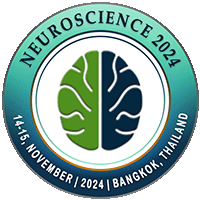
Sarada Devi
Tuanku Ja’afar Hospital, MalaysiaTitle: Anti-NMDA receptor encephalitis: A case of atypical acute psychosis with absence of neurological symptoms
Abstract
Anti-NMDA receptor encephalitis was first described by Dalmau et al where 12 patients were identified presenting with neuropsychiatric manifestations with positive serum & cerebrospinal fluid (CSF) to NMDA receptor antibodies. Symptoms include a highly characteristic set of neurologic deficits and prominent psychiatric manifestations. Misdiagnosis is frequent given the overlap of symptoms with psychiatric manifestations.
This is a case of a healthy 26 year old man with history of polysubstance abuse whom complained of intermittent dizziness, fatiguability & myalgia. He also experienced elementary in nature auditory hallucinations which were transient and resolve spontaneously. He was still able to function well. He presented to the Emergency Department weeks later with psychiatric manifestations. CT brain showed no significant abnormalities.
He was admitted to the psychiatry ward for further management. Throughout his detention in the ward he was restrained & isolated due to provocative behaviour.
In view of poor response to optimised poly psychotropics MRI brain was done and results showed multiple T2/FLAIR hyperintense foci in both centrum semiovale, right parietal lobe, right frontal lobe & left temporal lobe. He was treated as old infarct secondary to previous illicit drug abuse.
Despite being treated with optimal doses and duration of multiple antipsychotics, his psychosis failed to improve. Due to the atypicality of his psychotic episode, he was investigated for anti NMDA receptor encephalitis, of which he tested positive for.
He was immediately transferred to the medical ward and was treated with IVIG. He subsequently showed improvement. However, he is noted to have regressive personality changes.
The absence of neurological symptoms confounds the detection of this complex syndrome. This case underscores the need for increased awareness and high diagnostic suspicion of this rare clinical syndrome when approaching patients with acute onset of atypical psychosis. Prompt diagnosis is critical as early immunotherapy could dramatically affect outcomes.
Biography
Sarada Devi obtained her Doctor of Medicine (M.D.) at the age of 25 from First Sechenov Moscow State Medical University, Russian Federation. She has successfully passed her Paper A & B examination by the Royal College of Psychiatrists, UK. She has been serving under the Ministry of Health, Malaysia since 2012 and has been practicing in the field of Psychiatry & Mental Health for the past 8 years.
Sarada Devi has worked with the Clinical Research Centre at Queen Elizabeth II Hospital, Sabah where she was involved in research and training of health care workers in conducting clinical research. She has been invited to speak at various workshops in the field of clinical research and psychiatry.
In 2018, she obtained 3rd place for poster oral presentation titled Risk Factors Associated with Deliberate Self Harm among Patients Referred to the Liaison Psychiatry Unit, Hospital Tuanku Ja’afar Seremban presented at 6th Negeri Sembilan Research Day. She is also actively involved in organizing state level events to raise awareness on mental health.
Sarada Devi has received multiple awards for academic and service excellence. She has deep interest in clinical research and continues her research in psychiatry. Besides, her commitments to work, she has completed several half marathons.

